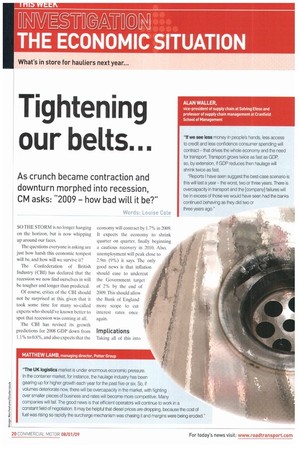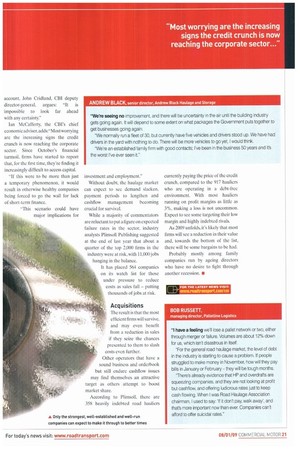Tightening our belts...
Page 20

Page 21

If you've noticed an error in this article please click here to report it so we can fix it.
As crunch became contraction and downturn morphed into recession, CM asks: "2009 how bad will it be?"
Words: Louise Cole
SO THE STORM is no longer hanging on the horizon, hut is now whipping up around our faces.
The questions everyone is asking are just how harsh this economic tempest will be, and how will we survive it?
The Confederation of British Industry (CBI) has declared that the recession we now find ourselves in will be tougher and longer than predicted.
Of course, critics of the CBI should not he surprised at this, given that it took some time for many so-called experts who should've known better to spot that recession was coming at all.
The CBI has revised its growth predictions for 2008 GDP down from 1.1% to 0.8%, and also expects that the economy will contract by 1.7% in 2009. It expects the economy to shrink quarter on quarter, finally beginning a cautious recovery in 2010. Also, unemployment will peak close to 2.9m (9%) it says. The only good news is that inflation should ease to undercut the Government target of 2% by the end of 2009. This should allow the Bank of England more scope to cut interest rates once again.
Implications
Taking all of this into account, John Cridland, CBI deputy director-general, argues: "It is impossible to look far ahead with any certainty."
Ian McCafferty, the CBI's chief economic adviser.adds:" Most worrying are the increasing signs the credit crunch is now reaching the corporate sector. Since October's financial turmoil, firms have started to report that, for the first time, they're finding it increasingly difficult to access capital.
"If this were to he more than just a temporary phenomenon, it would result in otherwise healthy companies being forced to go the wall for lack of short-term finance.
"This scenario could have major implications for investment and employment."
Without doubt, the haulage market can expect to see demand slacken, payment periods to lengthen and cashflow management becoming crucial for survival.
While a majority of commentators are reluctant to put a figure on expected failure rates in the sector, industry analysts Plimsoll Publishing suggested at the end of last year that about a quarter of the top 2,000 firms in the industry were at risk, with 11,000 jobs hanging in the balance.
It has placed 564 companies on its watch list for those under pressure to reduce costs as sales fall — putting thousands of jobs at risk.
Acquisitions
The result is that the most efficient firms will survive. and may even benefit from a reduction in sales if they seize the chances presented to them to slash costs even further.
Other operators that have a sound business and orderbook but still endure cashflow issues may find themselves an attractive target as others attempt to boost market share.
According to Plimsoll, there are 358 heavily indebted road hauliers currently paying the price of the credit crunch, compared to the 917 hauliers who are operating in a debt-free environment. With most hauliers running on profit margins as little as 3%, making a loss is not uncommon. Expect to see some targeting their low margin and highly indebted rivals.
As 2009 unfolds, it's likely that most firms will see a reduction in their value and, towards the bottom of the list, there will be some bargains to be had.
Probably mostly among family companies run by ageing directors who have no desire to fight through another recession. •








































































































































